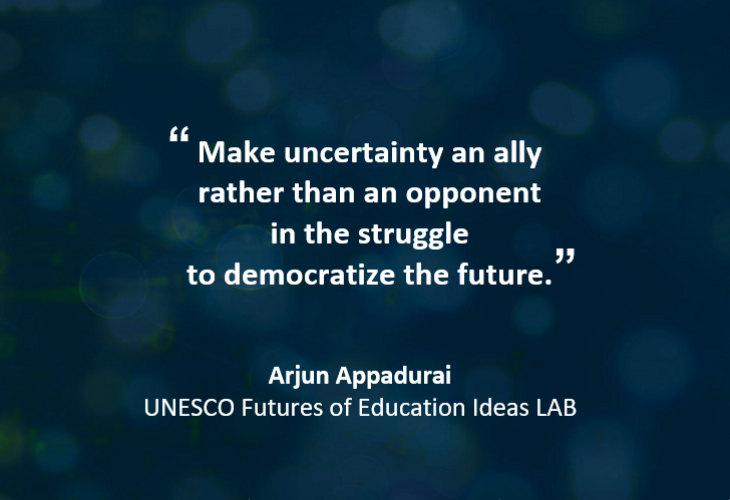Getting ahead of the curve of uncertainty
Arjun Appadurai - 1 March 2022

It was a great honor to be among those people privileged to contribute to this outstanding Report, which I am certain will be a useful tool for many teachers, researchers, students and parents, as they try to tailor their own local solutions to the planetary challenges we face.
I believe that the values, insights and concrete suggestions that have been assembled in this document can be a valuable resource in a time when the world has become saturated by uncertainty.
We are in the grip of radical uncertainty about the corona virus, and the avalanche of numbers, graphs, scenarios and predictions, even by the most judicious experts, has proved inadequate. Likewise, efforts to manage and redirect migration policy are regularly confounded by new movements of migrants, and produce new levels of uncertainty. The global financial markets produce even more uncertainty, even as they find new ways to profit from it. Democracy itself seems to rest on uncertain grounds, as autocrats in many countries rewrite constitutions, hijack elections and manipulate the media.
Historically, even the most enlightened efforts to bring justice, reason and freedom to the world have been behind the curve. They arrive on the scene after the damage is done, to repair wounds, restore normalcy, and revise policies. We need to use education to get abreast of the curve of uncertainty, rather than to pick up the pieces after the damage is done.
In this spirit, UNESCO and its many constituencies can help education to become transformative and not just restorative or corrective. Today’s transformations are often traumatic, exploitative or elitist. They produce uncertainty but do not equip us to design our own transformations, of society, culture or the environment.
rather than to simply react to transformations
that are imposed upon us.
There are ways to get ahead of the curve of uncertainty. One is to better balance the goal of transmitting acquired knowledge and the goal of creating new knowledge. We can only do this by enabling all citizens, especially those who are racially, economically or politically marginalized, to build their own designs for transformation, to be curious in their own settings and to find ways to imagine the future without requiring expensive and esoteric degrees and credentials. We can also shift the center of educational gravity from a small circle of experts, managers and consultants to a wider body of activists, community organizers and advocacy groups, so that our curricula, from Kindergarten to advanced graduate education, reflect the urgent dilemmas of multiple locations, rather than the abstract norms of a small expert community. Finally, we can teach students of all ages that uncertainty is a fundamental feature of our lives and that we need to make it the wind behind our sails rather than the storm we wish to avoid.
In short, to make education the midwife of multiple futures, we may need to embrace uncertainty rather to suppress or avoid it. This change, of course, will require us to change some of our inherited ways of thinking about knowledge, creativity and conjecture.
As we look ahead to the message of the Common Agenda articulated by UN Secretary-General Guterres, and to the planned UN Summit on Education in 2022, the Reimagining our futures together: A new social contract for education report will be a welcome tool for drawing in a wide constituency to help make uncertainty an ally rather than an opponent in the struggle to democratize the future.
Arjun Appadurai was a member of UNESCO’s International Commission on the Futures of Education and is emeritus professor at New York University and the Max Weber Global Professor at the Bard Graduate Center in New York.
Cite this article (APA format)
Appadurai, A. (1 March 2022) Getting ahead of the curve on uncertainty. UNESCO Futures of Education Ideas LAB. Retrieved from https://en.unesco.org/futuresofeducation/ideas-lab/appadurai-uncertainty.
Cite this article (MLA format)
Appadurai, Arjun. "Getting ahead of the curve on uncertainty". UNESCO Futures of Education Ideas LAB. 1 March 2022, https://en.unesco.org/futuresofeducation/ideas-lab/appadurai-uncertainty.